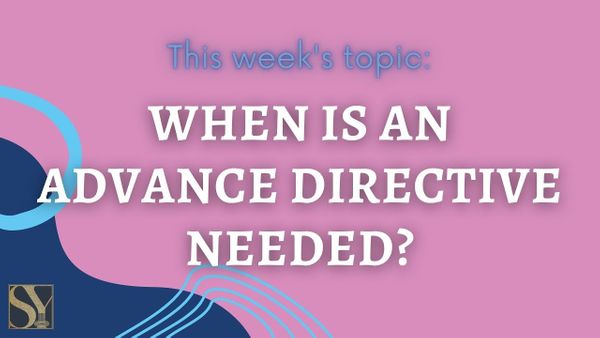Updated: Oct 7, 2021
The advance directive is a legal document that will detail any medical or healthcare care choices that need to be made, when an individual is in a coma, on life support, or unlikely to recover from being unconscious. For example, if a person goes to an emergency room for a heart-related injury or episode, goes into a coma, and is diagnosed as unlikely to recover, then that individual cannot make any other medical or healthcare decisions – someone else will need to manage that individual’s care from that moment on.
Why Are Advance Care Directives Important?
Most people don’t plan to have a medical emergency, and that is the nature of an emergency– they happen without any notice. In the perfect world, everyone would fully recover from an emergency or unexpected medical event. But in reality, a person can feel fine one minute and the next be in the position of being unable to care for himself or herself. These are the times that another person must make the decisions, on how care should be rendered to that person going forward.
How Are the Sick Person’s Wishes for Medical Care Going to Be Determined?
Well, this is the reason that an advance directive is important to have in place well before any emergency event or episode ever occurs. If someone is incapable of making healthcare or medical decisions, or is incapacitated to make those decisions, then it becomes a scenario in which no one will know what the person’s wishes would have been for care.
Don’t All Elderly People Want a Do Not Resuscitate Order in Place?
The answer is, not exactly. For example, if the person is elderly (terminally ill, struggling with an illness for many years, etc.), many elderly people in some cases do want to have a “Do Not Resuscitate” or DNR on file. This means that if the person goes into a situation of quickly approaching death whereby resuscitation is necessary to sustain that life, the individual prefers to be allowed to die naturally. On the one hand, many elderly people want a DNR, but there may be an elderly person who adamantly refused this directive and wants to be given every chance to “come back to life.” If the advance care directive is not in place, then the loved ones may not know that person’s wishes.
Without an Advance Directives, Can My Family “Pull the Plug” on My Care?
Not necessarily. For a family to be able to “pull the plug” on your care, even without an advance directive, there are important state and federal safeguards in place on account of the permanency of this action. In cases where there are diagnoses of a person unlikely to recover, there is going to be a family meeting with the full medical staff to determine the best medical course of action for the personal representative, and what care options are the best for the incapacitated individual (the patient).
Usually, a family member has to make choices on whether to terminate life support, and this decision can become difficult to make if you don’t know the person’s wishes beforehand. When it is the decision to remove life support to allow the person to die peacefully and no plausible recovery opportunity, the medical personnel can help guide the process. In these cases, the doctors and staff allow the family to be part of the process of the final days (and hours), and allow the family to have peace of mind that the patient and loved one is cared for with high quality care up to the end of the person’s life.
Maryland Estate Planning Lawyer – The Saint Yves Law Firm
When a person’s end-of-life decisions are outlined in advance of being needed, such as in an advance directive, if a traumatic life event does occur, it is actually easier for the family to handle this situation. You don’t have to be ill to have an advance directive. When you are ready to discuss this issue, schedule a consultation with our office, and let's talk. We are here to help you make the best decisions for your future health and medical care with the proper advance directive for your situation.


